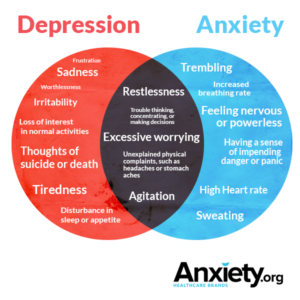- Your cart is empty
- Continue Shopping
How to cope with anxiety

How to cope with anxiety: increased anxiety?
A normal sense of anxiety and an unreasonable anxiety: how to distinguish?
The feeling of anxiety and the question of how to cope with anxiety, in one form or another, are familiar to everyone. Anxiety in the generalized sense is a feeling of inner anxiety, discomfort, dissatisfaction.
First of all, there are differences between anxiety and fear. Anxiety differs from him in the uncertainty of the subject of anxiety, vague sensations about future events. Late work, the coming exam, moving, changing jobs or professions, marrying, transferring a child to another school, etc. – situations where prospects are uncertain, when changes come, are alarming.
This is a normal, natural anxiety. In a situation that really causes concern, in a situation of life difficulties, changes, it is normal and helps to gather, responsibly approach their solution.
If a person begins to experience a feeling of anxiety often or permanently, for no apparent reason, such a condition can greatly interfere with life. Here we are talking about pathological anxiety.
How is it different from normal, adaptive anxiety? First of all, a person is not able to suppress or control feelings of anxiety and excitement. Unreasonable anxiety begins to guide his actions, his thinking.
In addition, unlike normal, pathological anxiety is not associated with any specific circumstances, it arises from reasons unknown to the person, in the situation of no real danger, the person is waiting for it, but does not know where it should come from, and even more so to cope with this.
For example: “I am constantly worried about children (husband, parents, friends, animals, apartment, etc.)”, “something bad can happen, at any moment”, “I worry about everything, and I worry that I am constantly worried “,” everything seems to be all right, but somehow I feel restless, something will suddenly happen. ”
If this happens to you, then it turns out that you are running ahead, in your thoughts – already there, in the future and in this future for some reason, everything is necessarily bad. And now, you already do not find a place for yourself, you swing from side to side, constantly somewhere you rush to call, do something, and talk with someone.
In this case, palpitation may become frequent, breathing may become intermittent, sweating, tinnitus, up to dizziness may appear. And, it seems that even the air is not enough, there is a feeling of a coma in my throat. It becomes difficult to fall asleep, the state of stress does not pass, it is difficult to concentrate attention, irritability, and nervousness appears.
This is a generalized picture of the state of pathological anxiety. Unreasonable anxiety is not really causeless. The bases of pathological anxiety are internal unresolved conflicts, strains, and sometimes – brain diseases. In either case, different kinds of anxiety disorders can be formed.
Anxiety disorder is a neurosis associated with a sense of anxiety, fear, tension, which develop for no apparent reason. Anxiety disorders occur quite often, according to different data from 9 to 25% of the population have ever suffered this ailment.
Fortunately, it is successfully treated by means of cognitive-behavioral therapy with the indispensable condition of your true desire and diligent participation. And in this article you will find those ways to cope with the anxiety, which you can apply yourself.
So, unlike normal, the non-adaptive sense of anxiety is not associated with a specific situation, it lasts longer, and it seems to you that it cannot be controlled. Let’s try to consider it more deeply.
Increased anxiety and picture of the world
Increased anxiety wherefrom is increased anxiety and a state of chronic anxiety?
You can use some medications to control anxiety as well.
Increased anxiety as a personal characteristic is often formed in people who are often forbidden by parents and frightened by consequences, such a person could be in a state of internal conflict for long periods of time.
For example, a child in arousal anticipates an adventure, and the parent to him: “this is impossible”, “it is necessary so-and-so,” “this is dangerous”. And then the joy of the forthcoming trip to the hike is drowned out by the prohibitions and restrictions that sound in the head, and at the exit we get an anxious state.
Such a scheme people carry into adulthood, and here it is – increased anxiety. The habit of worrying about everything can be inherited, the person repeats patterns of behavior of restless, about all experiencing mother or grandmother and receives “the inheritance” the corresponding picture of the world.
In it, he appears as a loser, whose head is bound to fall all possible bricks, but in a different way and cannot be. Such thoughts are always associated with a strong self-doubt, which began to form in the parent family.
Such a child, most likely, was fenced off from activities, did a lot for him and did not give him any experience, especially negative. As a consequence, infantility is formed, there is always a fear of error.
In adulthood, people rarely realize this model, but it continues to work and influence their life – fear of mistakes, lack of faith in one’s own strengths and abilities, distrust of the world give rise to a constant sense of anxiety. Such a person will strive to control everything in his life and the lives of his loved ones, since he was raised in an atmosphere of mistrust of the world.
Such attitudes as “the world is unsafe”, “one always needs to wait for a dirty trick anywhere and from anyone” – were in his parents’ family decisive. This may be related to family history, when parents received similar messages from their parents who survived, for example, war, betrayal, many hardships. And like, now everything is fine, and the memory of the difficult events is preserved for several generations.
In relation to others, the anxious person does not believe in their ability to do something independently well because he was beaten all his life and assured himself that he himself can not do anything. Formed in childhood, the learned helplessness is projected on others. “No matter how hard you try, it’s still useless.” And then – “and of course the brick will fall on me, and my loved one will not escape it”

A person brought up in such a picture of the world is constantly within the bounds of the obligation – he was once inspired by what he should be and what to do, what other people should be like, otherwise his life will not be safe if everything goes not ” as it should “.
A man pushes himself into a trap: after all, in real life, everything can not correspond (if ever) to the ideas that have been assimilated, it is impossible to keep everything under control, and the person, feeling that he “does not manage”, produces more and more disturbing thoughts.
Also, the formation of a personality prone to anxiety is directly influenced by stress, psychotrauma, the situation of insecurity in which a person has been for a long time, for example, physical punishment, lack of emotional contact with loved ones. All this forms a mistrust of the world, a desire to control everything, to worry about everything and to think negatively.
The increased anxiety does not allow to live here and now, the person constantly avoids the present, being in regrets, fears, anxiety about the past and the future. What can you do for yourself, in addition to working with a psychologist, how to cope with the anxiety itself, at least in the first approximation?
How to cope with anxiety. There are many website which provides more data about anxiety.
To begin with, realize that you are worried
How to remove the alarm Name the signs of your anxiety, pay attention to the body, fix what is happening to it. Say to yourself: “Yes, I am now worried,” take this feeling of anxiety in yourself, do not shut yourself off from it.
Do a breathing exercise – this is your “first aid”
A few deep breaths and maximally relaxed exhalations will help you quickly calm down. Try breathing with a delay in breathing: inhalation for 4 counts, a delay of 2, an exhalation for 4 and again a delay of 2. Several such cycles will noticeably change your state.
This practice, aimed at reducing anxiety, is successfully used by patients before the operation, when they are taken to the operating room on a gurney, the execution of respiratory equipment alone can significantly reduce anxiety.

Ability to be in the resource state can also answer you to the question “how to cope with anxiety”
I do not want to live with anxiety. A positive state is when you feel that there is enough energy to solve the tasks before you, when there are forces and to be happy, and to cope with difficulties.
When you are in the resource, problems and tasks are not frightening. You feel that everything is on your shoulder, your self-esteem and self-confidence are in order, your shoulders are straightened and you are full of healthy optimism.
Do you remember when you were in such a state? What gives you the opportunity to feel this way? What do you like to do and do you enjoy it? What gives energy and joy?
Everyone has their own answer to this question, and in order to regularly enjoy the benefits of a resource state, you need to know exactly what is a source of joy, pleasure, strength and just good mood for you.
What kinds of activities, what kind of people, objects, events? Maybe this is a favorite work? (and if you are currently engaged in the unloved, then your resource is not with you, and you need to think about how to activate it).
Maybe it’s a favorite sport or physical activity – swimming, walking or horse riding, any fitness, yoga, dancing, sauna, sauna, massage? Perhaps it is full of inspiration and exchange of positive energies with pleasant people – meetings with friends, trips to the city with family, a walk with a child in the park, meetings of those professional communities that you like?
Make up your own list of resources and continually replenish it. The main thing is to allow yourself to do this, allocate for this time, try not to save too much on important for your state of employment. After all, if you always postpone these studies “for later”, think that you have “no time” or “no money” – you only exacerbate the alarm, and it will further rob you of your strength, productivity will fall, time and money will be even less….

